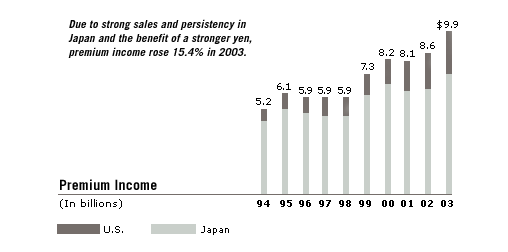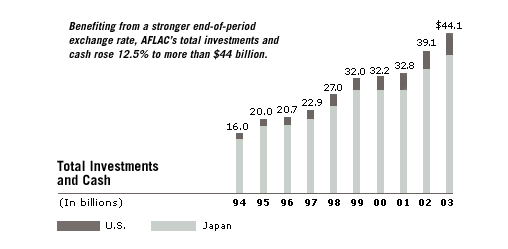
AFLAC Japanís operating efficiency may be its most important competitive strength. Because our operating costs are among the lowest in Japanís life insurance industry, we are able to offer the best products at the lowest possible price. We have honed our efficiency edge by using new technology to help us handle our growing business more quickly and efficiently.
Our newest initiative is called e-App, which is an updated form of our groundbreaking Cyclone software. With e-App, our sales force can electronically transmit policy applications to our headquarters in Tokyo. AFLAC Japanís sales associates can email a policy application through the Internet or even transmit it via cell phone. Also, our sales associates can use e-App to access an Internet portal site, which offers them access to a variety of AFLAC Japan agency services. We are confident that e-App will help our employees process policy applications more quickly, which will help us continue improving efficiency.
In 2003, we also continued development of our future computer systems and infrastructure. In July we transferred our claims administration to the new system, and we will eventually transfer the administration of our primary products onto this new system as well.
Investment yields in Japan improved during the second half of 2003, but still remained historically depressed. However, our investment philosophy remained constant. In fact, that philosophy is the backbone of our investment strength. We work to maximize investment income while minimizing risk. We emphasize liquidity, safety and quality when we invest. We donít own investment real estate, and equities accounted for less than .1% of AFLAC Japanís investments and cash at year-end 2003.
Instead, we primarily own longer-dated, yen-denominated debt securities to better match asset and liability durations. For that reason, our portfolio has weathered the low interest-rate environment fairly well. In fact, our portfolio yield on a Japanese regulatory reporting basis has been consistently higher than the industry average during the past 10 years. By staying with our straightforward and effective investment philosophy, we continued to produce strong results. Some AFLAC Japan investment highlights are listed below.
Investments and cash rose 11.5% to $37.9 billion at year-end. In yen, investments and cash declined .4%.
Net investment income increased 11.3% to $1.4 billion. In yen, net investment income rose 3.1%.
The average yield on new investments was 3.61% in 2003, compared with 3.93% in 2002.
AFLAC Japanís overall credit quality remained high. We believe that our conservative investment focus, which precludes us from buying junk bonds, is in the best interest of our policyholders and shareholders. However, one of the companies in which we had invested, Parmalat, experienced significant rating agency downgrades in a very short period of time in late 2003. We immediately revisited our credit analysis of Parmalat and concluded we should sell our investment in the company. On December 17, 2003, we sold our entire investment in Parmalat at a pretax loss of $257 million. Following the sale of Parmalat, we reviewed our top 30 holdings to reassess their creditworthiness and the size of each holding relative to the total portfolio. We concluded that our top 30 investments were still appropriate in terms of credit and size. We are also confident that our overall investment approach is sound and well-suited to our business.

Based on amortized cost, 68.2% of our holdings were rated ďAĒ or better, and only 2.8% were rated below investment grade at the end of 2003. Our sound investment policies have helped us maintain solid financial strength ratings. And our solvency margin remains one of the highest in Japan.

|